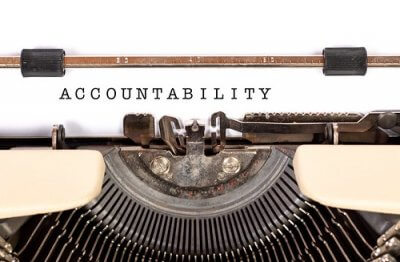Personal Accountability – Why You Need More of It, Now
by Andrea M. Darcy
Often feel a letdown, no matter how hard you try? Or has someone insinuated you need to ‘grow up’ a bit? Sounds like it’s time for some personal accountability.
What is personal accountability?
Relax. Personal accountability isn’t about being organised all the time, perfect, or an overachiever.
It simply means you choose to take responsibility for your words, actions, and behaviours, and for the outcomes that they produce, managing those outcomes if necessary. And that you do what you tell yourself you will do.
How to sabotage personal accountability
Not sure if you are or aren’t holding yourself accountable? Consider the following ‘accountability killers’.
1. Justifying your behaviours.
“It’s not that I meant to be late with this outline for the project, it’s just that I have family stress, and the deadline wasn’t realistic. Plus, you were late on the last outline, and things were fine in the end, weren’t they?”
Why do we justify our lack of accountability? It’s down to what’s known as ‘cognitive dissonance’. The difference between what we want to be real, and what is real, and in this case the dissonance is with our own self image.
In their book, Mistakes Were Made But Not By Me, Tavris and Aronson explain,“When we make mistakes, we must calm the cognitive dissonance that jars our feelings of self-worth. And so we create fictions that absolve us of responsibility, restoring our belief that we are smart, moral, and right—a belief that is dumb, immoral, and wrong.”
Watch out for:
- softening the facts
- claiming partial responsibility but not all
- referring to a past experience that is at fault
- shifting the target to something more minor and pretending that is the issue
- comparing yourself to others who were just as lacking in accountability.
2. Talking yourself out of things.
 “I know I said I would put myself out there, and I’m sure she is a nice girl, but I’m so tired with work lately, and it’s so much effort to get to downtown, I’ll date again when this project wraps up…”.
“I know I said I would put myself out there, and I’m sure she is a nice girl, but I’m so tired with work lately, and it’s so much effort to get to downtown, I’ll date again when this project wraps up…”.
The mind is a fabulous thing. We can use it to create and rationalise any manner of stories if we want to convince ourselves of something. But if you are using it to not be accountable to things you’ve committed to, you’re only holding yourself back.
3. Playing the ‘poor me’ soundtrack.
“It’s not fair, nobody understands, I am only struggling this much because he made me feel so bad in my last performance review, and you know as a child I was always called stupid.”
Welcome to victim mode. It’s the fastest way to let yourself off the hook. But we are all adults here. And adults have personal power.
Yes, sometimes bad things happen to good people. But we are responsible to dust off and find ways forward, instead of sitting on the spot blaming everyone.
The benefits of personal accountability
In society, groups, and organisations, accountability leads to acceptance, accolades, and avoiding various forms of punishment.
But what about personal accountability? When often, nobody else is even watching? What are the benefits of that?
1.You have more self worth.
Actually, someone is watching. You are. And, consciously or unconsciously, your actions and behaviours are judged and evaluated by yourself, affecting how you think and feel about who you are. Your self-worth is at stake.
2. You take more action.

photo by: luis villasmil
When we are personally accountable, we go after our goals and dreams instead of just talking about them. You then feel a sense of achievement, which of course feels good.
3. Others trust you more.
If we are always talking about things we want to do, but then never do any of them? Never get in shape, never go after that better job, never leave that unhealthy relationship?
Or when things go wrong, blame others over take responsibility?
Other people notice. It’s only if we are accountable that people see us as someone they can trust and turn to.
4. More importantly, you can trust yourself.
One of the biggest killers of self-esteem? Not being able to rely on yourself. Not knowing if you will do what you say you will, or how you will react when things go badly.
When you begin to take accountability, you start being there for yourself. You can relax and trust yourself to not sabotage but to carry through.
4. Your relationships improve.
It seems feeling accountable makes for better relating with others.
A 2005 study on students found that when encouraged to take personal responsibility, their social interactions were better.
3 Ways to boost your accountability
So then how to stop letting yourself down all the time?
1. Keep your eyes on your values.
It’s hard to be accountable if we hate what we are doing in life and it feels like pushing through sand.
Your personal values are what you care about when everything else falls away. Learning what you value, as opposed to what you think you should value, can help you narrow in on what you really want in life.
2. Work on recognising and changing limiting beliefs.
Always sabotage yourself? Go out drinking the night you are to set up your personal website, forget to call that job lead after promising yourself for days you would?
Often it’s because of limiting core beliefs. If as a child a difficult experiences meant you decided, for example, “I am not worthy of good things”? Then you will unconsciously make decisions to prove it true.
3. Underpromise and overdeliver.
A perfect way to sabotage accountability is to always set ourselves up to fail with overextending ourselves. Try the rule of halves.
If you can’t promise yourself to do only half as much, then double your timeframe.
Always overpromising can also come from not actually knowing how to set achievable goals. Also learn a model like SMART goal setting.
Can mental health issues be in the way?
Tried everything but never seem to be able to do what you said you would? There are mental health issues that can make accountability hard.
Depression and anxiety make it hard to think straight and stay organised.
Adult ADHD means your habit of distraction leaves you forgetting things or not finishing things.
Childhood trauma is a big blocker of accountability. It leaves you with damaging beliefs about your self worth that see you in endless loops of self-sabotage.
What talk therapies help with personal accountability?
Older forms of psychotherapy like psychoanalysis require a good therapist who spots any tendency to play the victim, or you can feel encouraged to blame the past.
But several modern talk therapies very much encourage personal accountability, such as:
- person-centred counselling
- humanistic counselling
- acceptance and commitment therapy (ACT)
- cognitive behavioural therapy (CBT).
Ready to up your personal accountability and move forward? We represent a roster of top London psychotherapists and counselling psychologists who can help. Or find a UK-wide therapist or online counsellor on our booking site.
 Andrea M. Darcy left a career as a screenwriter to focus on writing psychology and personal development. She has training in coaching and person-centred therapy. Find her @am_darcy
Andrea M. Darcy left a career as a screenwriter to focus on writing psychology and personal development. She has training in coaching and person-centred therapy. Find her @am_darcy





